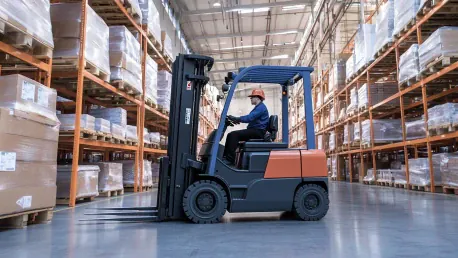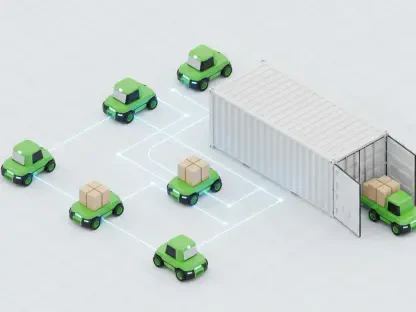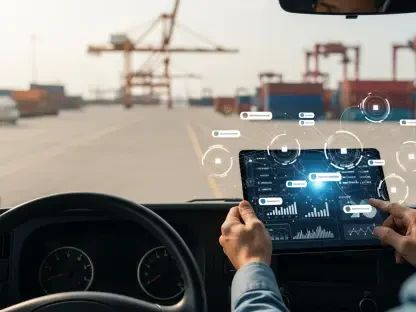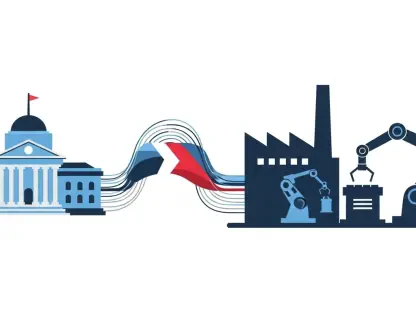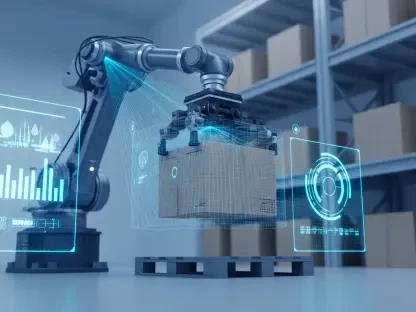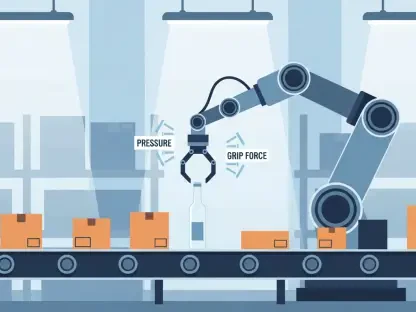The electric forklift market is experiencing a remarkable surge as industries increasingly embrace sustainable material handling solutions. This growing demand is driven by the need to meet environmental regulations, operational efficiency, and cost-effectiveness. As a result, electric forklifts are becoming integral to modern warehousing and logistics operations, underpinning the industry’s future. This article explores how these advanced machines are shaping the future of warehousing.
Key Drivers of Market Growth
Emphasis on Sustainability
The world is undergoing a comprehensive shift toward sustainable practices as governments around the globe implement stringent regulations designed to reduce carbon emissions. This regulatory environment has prompted businesses to transition from internal combustion forklifts to electric alternatives. Electric forklifts are favored for their lower operating costs, decreased maintenance requirements, and enhanced efficiency, making them a practical solution for achieving sustainability goals.
The decrease in emissions from electric forklifts significantly contributes to the reduction of industrial carbon footprints. Their quiet operation also enhances the work environment, reducing noise pollution in bustling warehouse settings. As companies worldwide aim to align with global environmental objectives, the adoption of electric forklifts becomes not just an option but a necessity. The transition towards electric forklifts thereby supports a more sustainable and responsible industrial landscape.
Advancements in Battery Technology
Lithium-ion batteries are at the forefront of transforming the electric forklift market. These advanced batteries offer longer operational life and faster charging times compared to traditional lead-acid alternatives. With their superior energy efficiency and prolonged lifespan, lithium-ion batteries present a compelling value proposition for modern industrial applications, driving the widespread adoption of electric forklifts in warehouses.
One of the most notable benefits of lithium-ion technology is its rapid charging capabilities, minimizing downtime and ensuring that forklifts are available for work with minimal interruption. Moreover, lithium-ion batteries eliminate the need for regular maintenance and watering, alleviating some of the operational burdens. Enhanced by their consistent energy output and reliability, these batteries are setting new standards in the industry, solidifying their role as the preferred power source for the next generation of electric forklifts.
Impact of E-Commerce and Urbanization
Growth of E-Commerce
The rapid growth of the e-commerce industry has significantly boosted the demand for electric forklifts. As online shopping continues to surge, the need for efficient and reliable material handling in warehousing and distribution centers becomes paramount. Electric forklifts offer the operational efficiency needed to handle the increased volume of goods, implementing their role as an essential asset in the e-commerce supply chain.
Electric forklifts bring several advantages to e-commerce operations. Their precision in handling goods minimizes damage, ensuring that products reach consumers in perfect condition. Additionally, their eco-friendly nature aligns with the sustainability goals many e-commerce giants are now prioritizing. As demand for quicker and more efficient delivery services heightens, the reliability and performance of electric forklifts are becoming indispensable in maintaining seamless e-commerce operations.
Urbanization and Smart Warehouses
Urbanization and the development of smart warehouses are revolutionizing logistics and warehousing operations. Modern warehouses are increasingly integrating automated systems to enhance productivity and accuracy. Electric forklifts, known for their precision, low emissions, and automation compatibility, align perfectly with the requirements of these smart warehouse environments, significantly contributing to market growth.
The trend toward urbanization demands that warehouses operate more efficiently in densely populated areas where space and resources are limited. Electric forklifts, with their compact and efficient designs, allow for better space utilization and contribute to the overall automation strategy. This shift toward smarter, automated warehouses ensures that electric forklifts remain at the forefront of material handling solutions, enabling businesses to optimize their supply chains and meet the dynamic demands of urban centers.
Segmentation and Regional Analysis
Market Segmentation
The electric forklift market is segmented based on type, battery type, application, and end-user industry. Counterbalance forklifts, warehouse forklifts, and reach trucks cater to diverse warehouse needs, with counterbalance forklifts being the most versatile. These types of forklifts are crucial in handling different load capacities and maneuvering in various settings, making them indispensable in modern warehousing.
The distinction between lead-acid and lithium-ion batteries plays a critical role in the market’s development. While lead-acid batteries have been traditional, the shift to lithium-ion technology is gaining momentum due to its enhanced efficiency and lifespan. Moreover, applications differ as electric forklifts are employed in both indoor and outdoor material handling tasks. Inventory-driven industries, such as logistics, retail, automotive, and food & beverages, form the primary end-user sectors, each with specific operational requirements met by tailored forklift solutions.
Regional Market Dynamics
The growth of the electric forklift market displays considerable regional variation, influenced by numerous socio-economic factors. In the United States, automation and the expanding e-commerce sector significantly boost the demand for electric forklifts. Advanced warehousing practices and sustainability initiatives are key drivers behind this trend, positioning the U.S. as a major market player.
China stands out as the global leader in the electric forklift market, bolstered by rapid industrialization and government incentives aimed at promoting electric vehicle usage. China’s extensive manufacturing and logistics industries provide a fertile ground for electric forklift adoption. Additionally, countries like Germany and Japan exhibit strong market demand due to high investments in warehouse automation and leading advancements in battery technologies. In India, the market is steadily expanding, driven by industrial growth and increased focus on sustainable solutions fostered by government initiatives.
Competitive Landscape
Leading Market Players
The electric forklift market is highly competitive, with key players continually innovating to enhance their market presence and product offerings. Companies such as Toyota Material Handling, Jungheinrich AG, and Crown Equipment Corporation are leading this charge by integrating advanced technologies such as AI-powered navigation and smart warehouse solutions. These technological advancements enable more efficient, accurate, and safe material handling procedures.
Toyota Material Handling has been investing heavily in the development of next-generation electric forklifts featuring AI-powered navigation systems designed to optimize warehouse operations. Jungheinrich AG is making notable strides with its pioneering lithium-ion technologies, offering a competitive edge with longer battery life and faster charging times. Similarly, Crown Equipment Corporation focuses on automation and connectivity, providing comprehensive fleet management solutions that boost operational efficiency and reduce costs.
Strategies for Growth
To maintain competitiveness, market players are investing in next-generation electric forklifts and forming strategic collaborations. For instance, Hyster-Yale Materials Handling, Inc. is emphasizing the integration of high-performance lithium-ion batteries and hydrogen fuel cells into its product lines. By leveraging these advanced technologies, they aim to enhance efficiency and reduce environmental impacts. KION Group AG also focuses on innovative growth strategies, incorporating AI-driven automation and intelligent material handling solutions in their offerings.
These efforts highlight the industry’s commitment to innovation and sustainable practices, ensuring that leading companies remain at the forefront of market evolution. Such strategic initiatives are essential in adapting to the rapidly changing technological landscape and meeting the growing demands for efficient and eco-friendly material handling solutions.
Future Outlook and Considerations
The electric forklift market is currently experiencing significant growth as more industries adopt sustainable material handling solutions. This rising demand is driven by the necessity to comply with environmental regulations, enhance operational efficiency, and reduce costs. Consequently, electric forklifts are becoming essential components of modern warehousing and logistics operations, playing a crucial role in shaping the industry’s future. Electric forklifts offer numerous benefits, including lower emissions, reduced noise levels, and lower maintenance costs compared to their internal combustion counterparts. Their ability to contribute to a cleaner and more efficient work environment makes them an attractive choice for businesses looking to improve their sustainability footprint. As the industry continues to evolve, electric forklifts will remain at the forefront, driving innovation and setting new benchmarks in warehousing and logistics.
